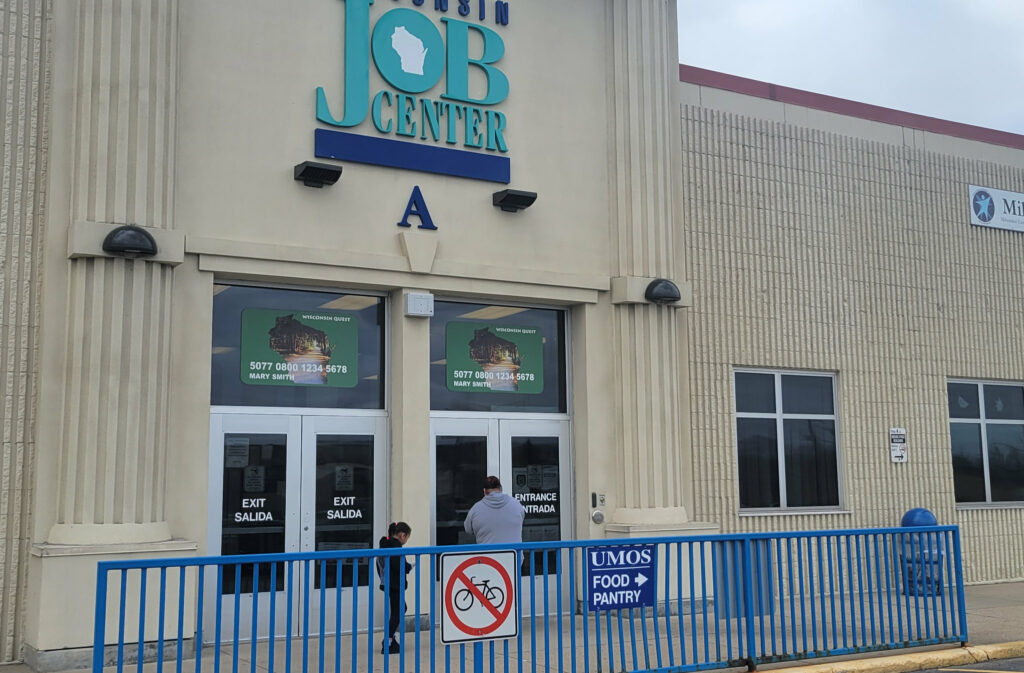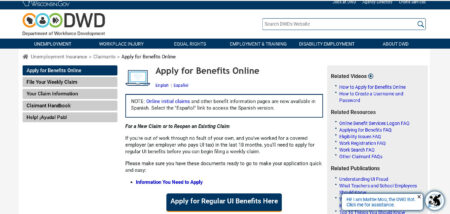New Program Helps Wisconsin Residents Navigate Unemployment System
Partnership between UMOS and Department of Workforce Development helps people access complicated system.

The Unemployment Insurance Navigator Program at UMOS helps residents navigate the process of accessing benefits. Photo by Edgar Mendez/NNS.
More than 142,000 individuals in the state completed initial claims for unemployment insurance benefits in 2022, according to data from the Wisconsin Department of Workforce Development, or DWD. Nearly 29,000, or 20%, of those claims originated from Milwaukee County.
Although the number of applicants is significant, many others who are eligible to receive benefits don’t apply for unemployment or are unable to navigate the application process, said Jose Martinez, senior vice president of United Migrant Opportunity Services, or UMOS.
Barriers to accessing benefits include cognitive disabilities, language barriers and a lack of understanding of the application process itself, Martinez said.
Making mistakes during the application process can lead to financial penalties in the future or affect your eligibility, he added. Not being able to access these benefits can cause numerous hardships for families, especially those who are underserved or living in poverty.
UMOS and the DWD have partnered to assist individuals overcome those challenges with the new Unemployment Insurance Navigator Program. The program, which started this year, helps people learn whether they are eligible to receive benefits, how to apply for them and how to meet the requirements to receive benefits, among other support.
The program was designed to help groups who are traditionally underrepresented in the unemployment insurance pools, Jose Martinez said. Those include migrant, seasonal farm workers, individuals with limited English proficiency, low-wage workers and people of color, he said.
Data from the Department of Workforce Development shows that 72% of individuals who completed their initial claim in 2022 were white residents, compared with, for example, 15% for African American residents and 9% for Latinx residents.
“Wisconsin’s UI program should be available to all workers who otherwise qualify, but we know that certain barriers to program access have long existed,” DWD Secretary-designee Amy Pechacek said.

Some individuals often have trouble navigating the online process to apply for unemployment benefits. Photo by Edgar Mendez/NNS.
By collaborating with a community partner in UMOS, DWD hopes that outreach will result in more equitable access to the program.
Rebecca Kikkert, director of the Office of Special Initiatives within the Division of Employment and Training at DWD, said that navigators will also help families during a challenging time by directing them to other state programs, including W-2, the state’s primary Temporary Assistance for Needy Families program, FoodShare or emergency rental assistance.
“We’re striving to ensure that all eligible workers receive benefits and also other support for them and their families,” Kikkert said.
Jose Martinez said that in addition to those resources, navigators can also provide information on job training programs that people can access while also receiving benefits.
“Our role in many circumstances is to let them know of the options they have,” he said. “Maybe there is a training program for you that will help you improve your skill set to get a better job.”
Some of those lessons were already learned during the COVID-19 pandemic, when states expanded unemployment benefits to larger pools of applicants, creating massive backlogs and other problems.
Other challenges have yet to be fully understood, Martinez said. Those include questions about why some people of color who qualify for benefits don’t apply or what mechanisms could be put in place to make the process easier.
“We want to document who needs help and what kind of help people need and share that information in hopes that we can help improve the process nationally,” he added.
For more information
Here are some tips from UMOS about when to apply for unemployment insurance benefits.
- When you are totally unemployed.
- When you are partially unemployed (your weekly earnings are reduced).
- When you expect to be laid off within the next 13 weeks and would like to start your benefit year early.
- Left your last job and can show it was for good cause.
If you are interested in receiving help from a navigator, call the local number at 414-377-5004, the toll-free hotline at 1-855-203-9444 or send an email to ui.navigator@umos.org.
New program helps individuals navigate complicated unemployment insurance system was originally published by the Milwaukee Neighborhood News Service.




















